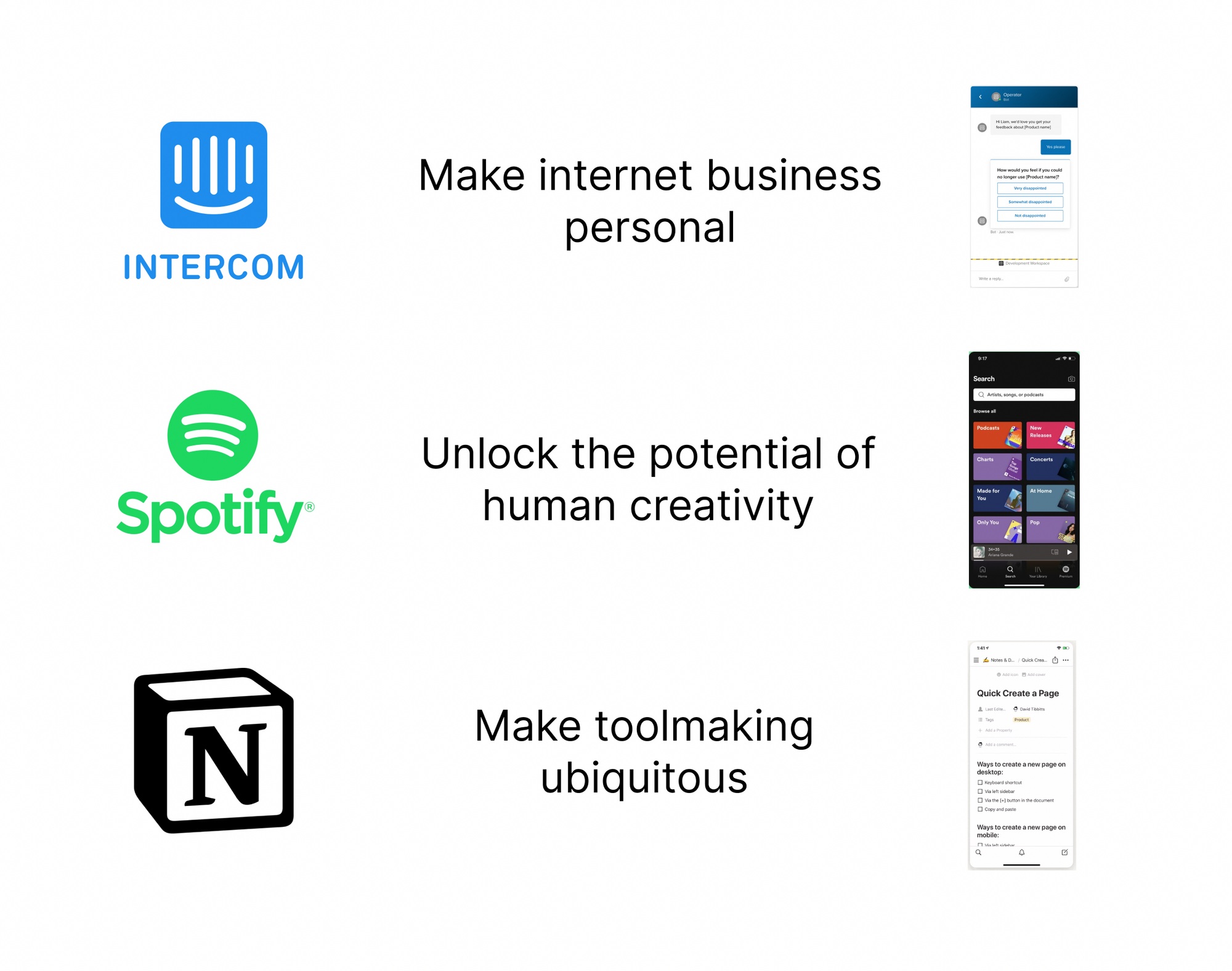Look Beyond Company Mission When Making Career Choices

Many tech companies describe themselves as “mission-driven”: their mission motivates employees and guides company direction. While a company’s mission can focus on social good or impact, it doesn’t have to. And even though a mission can tell you what a company does, it can’t always tell you what working at the company is actually like. So when evaluating career decisions, the company mission should be one of several factors.
What a company mission is—and isn’t
A company mission defines what a company does and why it exists. Mandy Sherman, who has worked in the non-profit sector for over eight years, adds, “The mission is the reason for being for an organization.”
Because a company mission describes what the company does, it’s a powerful branding tool. It can help cast the company’s products or services in an aspirational light.
Especially at software companies with intangible products, the mission can feel a little separated from what the company does day-to-day. A few examples highlight how mission can elevate a company’s products and services:
- Intercom’s mission is “to make Internet business personal,” but its primary product offering is support software.
- Spotify’s mission is to “unlock the potential of human creativity,” but they offer audio streaming.
- Notion’s mission is to “make toolmaking ubiquitous,” but they sell a suite of documentation tools.

Keep in mind that a company’s mission might change over time. Earlier-stage startups might pivot, so the mission might evolve, shift, or expand. For example, maybe a company’s mission originally is to make medical appointment bookings easy. But if the competition from established players like ZocDoc is too fierce, the company may keep its booking software but sell it to small business owners like spas and salons.
Look at more than the mission
For many of us, finding a company whose mission aligns with our values is important. After all, we spend at least 8 hours each day at our jobs, so the company might as well connect to what we care about or allow us to effect change in the world.
However, the mission shouldn’t be the only criterion on whether to join or stay at a job. Most for-profit startups must provide value to investors, no matter their stated mission. Sarah Esterman, Head of Lifecycle Marketing at Webflow who writes and speaks about their experiences working in tech with a chronic illness, explains, “Of course, missions are aspirational by design. They are meant to sound lofty. We’re meant to think we’re changing the world and doing a public service by working for our very for-profit employers—even though we’re not.”
Rather than placing emphasis on the mission when evaluating a job, be sure to consider other factors. Esterman recommends asking the following questions:
- “Whether the company meets my moral/ethical compass, which is a super subjective thing
- Do the expectations for in-office vs remote meet my needs?
- How well does the company pay for my position?
- What are the time away policies? Do they meet my needs as a chronically ill disabled person? How much sick time is there? How much PTO is there?
- Does the benefits package meet my needs? Are my doctors in-network?
- Are there other types of compensation, like stipends for gym memberships or at-home internet?
- What do current and former employees have to say about the employer? (Note: It’s a good idea to take online reviews on sites like Glassdoor with a grain of salt, since you’re typically only going to see reviews from the happiest and least happy people, as opposed to people who are simply doing fine at work.)”
Company mission ≠ company culture
Having a clear, defined mission can do a lot for an organization and its employees. The mission can act as a North Star for any decisions or during crises. The mission can also unite employees in their work and inform the company’s values.
Lull Mengesha, author and founder of Tiphub, a mutual aid payment aggregator, says, “Having a clear mission helps everybody understand what are the best next steps when an event happens.” Any time that a crisis comes up, the next step is clearer because the mission guides all decision-making. Mengesha adds, “Anyone who’s working on Tiphub understands the goal is to bring aid to people who are displaced,” so any decisions are first evaluated against the mission.
Additionally, the mission can create cohesion across coworkers: a shared reason for being. Sherman explains, “In a mission-driven organization, the mission is the glue that holds everything together…the reason [employees] have chosen to work there is because they care about what the organization does. They want to contribute to a particular cause they’re really passionate about, and working at that organization is a way to support that.” Without a mission, employees may lose their motivation for being there. The unity among teammates might evaporate.
But a company mission isn’t the same thing as its culture. Although ideally a company embodies its mission through its culture and values, the inner workings of a company may be disorganized or even toxic.
Unfortunately, in the world of tech, there are many examples of companies with ambitious, world-changing missions whose cultures fell short:
- Tesla’s mission is “to accelerate the world’s transition to renewable energy,” but reports of Tesla’s discriminatory practices against POC and women abound.
- The suitcase company Away described its mission as “create equitable access to the transformative benefits of travel—for everyone,” but the company’s CEO was accused of fostering a toxic work environment.
- Startup incubator and social club Launch House pitched a community for founders to provide better connections and skills—but was alleged to have retaliated against victims of sexual assault and hosted drug-fueled, uncontrolled parties.
Company missions can be misused (and abused)
A company mission can keep everyone aligned and guide key decisions, but the mission can also be wielded to push employees to tolerate unsafe or harmful environments.
Remember that any company, regardless of its mission, is still run by people and can have flaws. Sherman adds, “It is just like any other job: there are ups and downs, pros and cons, things that are going to bug you. If you don’t have that feeling that the mission is present consistently, it becomes any other job that you could just as easily take or leave.”
But missions can also lead to underpaying employees and pushing them into burnout. In an article for LinkedIn, Shauna Springer, PhD, writes, “In the space of ‘mission-driven’ work, there can be a tendency for individuals and organizations to de-value others’ time and talent. Unintentionally—and sometimes very intentionally, organizations can make mission-driven individuals feel that ‘if you really care about this mission, you’ll give away your time and intellectual property free of charge.’”
Esterman says, “The problem is that these missions are often used to make us settle for less than we deserve.” Employees of mission-driven orgs might feel that they are asked to tolerate negative or harmful working conditions “for the mission”:
- Long days
- Low compensation
- Minimal benefits
- Poor work-life balance
- Limited career growth
Esterman lays out their advice for anyone who finds themselves in this situation:
If your job still meets some but not all of your needs, you might want to look at creating more boundaries between work and the rest of your life by working less, keeping a strict schedule, or taking more time for you during the day, if you can. Find joy in things outside of work and remember your career doesn’t have to be your identity. Your job can be just a job.
But if your job doesn’t meet your needs and you feel, deep down, like you need to leave, then start figuring out an exit plan. For some, that might mean quitting right away. For others, it means quietly exploring other opportunities and reminding yourself you have agency. Even the act of applying for another job can sometimes make you feel better and less out of control.
It’s important before joining a mission-driven company to research what it’s really like to work there. You can do this in the interview by asking for specific examples as well as by finding current employees on LinkedIn to ask if they’ll chat with you about their work at the company. And don’t forget: you can have a great, engaging job at many different types of companies with a variety of missions. Esterman sums it up: “Work doesn’t have to be world-changing to be interesting.”
If you’re deciding what to do next with your career in tech, meeting with a mentor can help you find clarity and identify steps you can take to move forward. Sign up for Merit today and connect with a mentor—for free.
